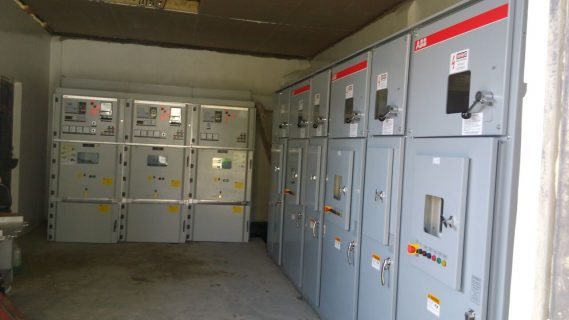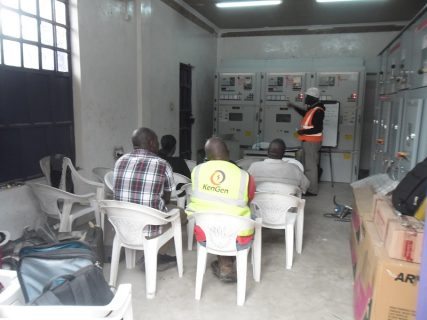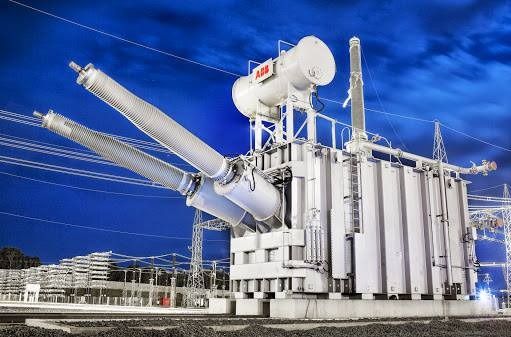ABB is a pioneering technology leader that is driving growth in four customer-focused entrepreneurial divisions; continuing more than a 125-year history of innovation. Operating in more than 100 countries with about 132,000 employees, ABB today is writing the future of industrial digitalization and driving the Energy and Fourth Industrial Revolutions.
With more than four decades at the forefront of digital technologies, they are a leader in digitally connected and enabled industrial equipment and systems with an installed base of more than 70,000 control systems connecting 70 million devices.
The ABB Group was formed in 1988 through a merger between Asea AB (1883) of Sweden and BBC Brown Boveri AG (1891) of Switzerland. Asea AB was a major participant in the introduction of electricity into Swedish homes and businesses and in the development of Sweden‘s railway network. In the 1940s and 1950s, Asea AB expanded into the power, mining and steel industries. Brown Boveri and Cie (later renamed BBC Brown Boveri AG) was formed in Switzerland in 1891 and initially specialised in power generation and turbines.
Although ABB’s first activities in South Africa date back to 1907, the first of the 11 ABB companies in the Southern Africa region active today was set up in 1992 and at the same time ABB began to build its presence in the Southern Africa region. ABB has shown a strong commitment to the Southern Africa region by making several investments over the past 20 years including acquisitions such as a capacitor manufacturer, a level detection and laser measurement technologies manufacturer and a mine-hoist related business.
At its regional head office in Longmeadow, Johannesburg, ABB has several manufacturing operations including medium voltage switchgear, high voltage protection, rectifiers and a robotics programming and servicing centre. At its Alrode, Johannesburg, premises ABB has an AC machines factory that manufacturers medium voltage electric motors for local and export markets.
The company has a strong presence in the Southern Africa region with engineering and sales offices in Angola, Botswana, Democratic Republic of Congo, Kenya, Mauritius, Mozambique, Namibia, Tanzania, Uganda, Zambia and Zimbabwe.
Also Read: ABB opens service centre in Tanzania
Strategy
ABB’s strategy is focused on organic growth, with an eye toward acquisitions that build on capability. Energy efficiency, urbanization and other megatrends will create opportunities – our task is to execute and create value for all of our stakeholders
They serve utility, industry, and transport and infrastructure customers in a combined market worth more than $600 billion per year. In all three customer segments, their combined offering of power and automation provides a unique value proposition for customers as they provide solutions for secure, energy-efficient generation, transmission and distribution of electricity; and for increasing productivity in industrial, commercial and utility operations. To enable them deliver value for their customers and to provide sustainable, profitable growth for their shareholders, ABB interacts with a wide range of business partners along their value chain. They aim to build long-lasting partnerships to create shared value – with suppliers, customers, business partners, employees and the communities in which they operate.
ABB business
ABB is active across the entire energy value chain. Their solutions range from power grids to automation systems that provide full visibility and control over installations ranging from mines to offshore platforms to manufacturing plants, buildings and homes. In addition, they supply power and automation solutions from advanced power transmission equipment to turbochargers, industrial robots, electric-vehicle charging stations and individual circuit breakers.
Their solutions and products are found in power plants, factories, ships, trains, buildings and urban infrastructure. Globally, they serve millions of customers, either directly or through their distributor networks, ranging from governments and state-owned utility companies, from the world’s largest corporations, to small and medium-sized businesses.
To better address customer needs and deliver operational efficiency, they realigned their organizational structure from the start of 2016. Their new streamlined structure is comprised of four global divisions, Electrification Products, Robotics and Motion, Industrial Automation and Power Grids; which in turn are made up of specific business units focused on particular industries and product categories organized to best serve their customers and markets.
Electrification Products
ABB offers technology across the full electrical value chain from substation to the point of consumption, enabling safer and more reliable power. They also offer a range of digital and connected innovations for low- and medium-voltage, including EV infrastructure, solar inverters, modular substations, distribution automation; power protection, wiring accessories, switchgear, enclosures, cabling, sensing and control.
Their customers include: Distributors, installers, panel builders, OEMs, system integrators, contractors, architects and end users.
Notably, ABB ships over 1 million products to customers worldwide every day.
Robotics and Motion
With regards to robotics and motion, ABB offers: Motors, generators, drives, mechanical power transmission, robotics; wind and traction converters.
Their customers include: Manufacturers, OEMs in a variety of industries and utilities, industry end users and transportation and infrastructure operators.
Notably, ABB is the world’s largest supplier of industrial electric motors and drives.
Industrial Automation
With regards to industrial automation, ABB offers: Products, systems and services designed to optimize the productivity of industrial processes. Solutions include turnkey engineering, control systems, measurement products, life cycle services, outsourced maintenance and industry specific products (e.g. electric propulsion for ships, mine hoists, turbochargers and pulp testing equipment).
Their customers include: Process industries such as oil and gas, petrochemicals, mining, metals production, marine, pulp and paper, and cement.
Notably, ABB delivered the world’s first power-from-shore solution for an offshore rig.
Power Grids
ABB’s Power Grids division offers power and automation products, systems, services and software solutions across the generation, transmission and distribution value chain. Its portfolio includes: grid integration, transmission, distribution and automation solutions and a complete range of high voltage products and transformers.
Their customers include: Power generation, transmission, distribution and other utilities; industries across the spectrum, transportation and infrastructure customers, and commercial enterprises. ABB Power Grids division is the partner of choice for enabling a stronger, smarter and greener grid.
Notably, ABB pioneered HVDC technology more than 60 years ago and is responsible for around half the world’s HVDC installed base. ABB is the world’s largest maker of transformers and a technology and market leader in high-voltage products and substation solutions, pushing voltages to record levels.
 Challenges and opportunities
Challenges and opportunities
Today, ABB faces two key global trends in our business. One is the acceleration towards renewable energy sources, resulting in unprecedented demands to manage the complexity of the ‘digital grid’ of the future. The other is what we call the industrial revolution of ‘Internet of Things, Services and People’; resulting for example in growing intelligence of machines that is driving quantum leap improvements in productivity and safety in industry. As a pioneering technology leader, ABB is driving this change and supporting their customers to benefit from both of these shifts. They see the customers as key to their business, now and in the future, and essential to solving the underlying causes of key challenges that are affecting the world today, namely climate change and weak economic growth.
In power generation, renewables are transforming the energy mix, putting pressure on traditional producers to rethink their business models while lessening environmental impact and dramatically increasing grid complexity. The future grid will be far more complex with multiple feed-in points from traditional power plants to large-scale renewables on the supply side, and a coexistence of traditional demand patterns and microgrids and nanogrids on the demand side. Managing this complexity will require intelligently automated, digital power grids that can anticipate demand and supply patterns, while routing and transporting power to the ever-increasing number of consumption points of electricity.
On the automation side, advances in sensor technology, combined with ubiquitous connectivity and massive increases in our ability to process and store data, are enabling machines to become more and more intelligent, as well as to learn and to interact with humans in new ways. The basis for this is the industrial Internet of Things, Services and People. In time, this will enable the next stage of industrial automation, in which machines and entire process chains learn to reason and take decisions, making processes self-regulating and self-optimizing.
An entire range of digital solutions – for the first time: ABB Ability brings together all of our digital products and services, each built from a unique combination of sector knowledge, technology leadership and digital expertise, to create real business value for the customers. ABB Ability connects the customers to the power of the Industrial Internet of Things and, through their services and expertise, goes further by turning data insights into the direct action that “closes the loop” and generates customer value in the physical world. ABB Ability’s leading technology products and services can be applied across different industries; and are already helping the customers achieve significant value through digitalization and closing the loop. Some examples include:
Virtual commissioning: 4-D simulated factories can now be created in the digital space, so that commissioning issues in the real world can be solved in advance.
ABB smart sensors: Their cost-effective, pocket-sized sensors attach to almost any existing low-voltage motor, delivering analog factories the benefits of the Industrial Internet of Things.
Digital substations: Digitalization and ABB’s deep knowledge of power transmission are coming together to improve the integrity of the electrical grid.
Products and services – contributing to a better world
Many of the benefits of the modern world, from electricity at the touch of a switch to the consistent high quality of industrial goods, are made possible by technology that was pioneered, improved and adapted by ABB over more than a century of innovation. Technological innovation remains a cornerstone of ABB’s competitiveness and a key driver of profitable organic growth.
In 2015, they invested $1.4 billion, or 4 percent of revenues, in research and development by their 8,200 technologists. In this way they create and support a comprehensive range of products, systems and services that increase energy efficiency, reliability and productivity for industrial, utility, transport and infrastructure customers. It is through this comprehensive offering that ABB makes a key contribution to a ‘better world’. Their energy efficient and renewable energy portfolio directly contributes to the reduction of greenhouse gas emissions, while their technologies also facilitate access to reliable, modern energy, contributing to economic growth and improved quality of life for communities.

Sustainability at ABB
For ABB, sustainability is about balancing economic success, environmental stewardship and social progress to benefit all the stakeholders. Sustainability is part of ABB’s corporate strategy and business success.
Sustainability considerations cover how they design and manufacture products, what they offer customers, how they engage suppliers, how they assess risks and opportunities, and how they behave in the communities where they operate and towards one another, while striving to ensure the health, safety and security of the employees, contractors and others affected by their activities.
ABB is investing in local communities in the areas of education and health. They invest in efforts to bridge the gap between industry and public engineering colleges, universities of technology and engineering universities. They are striving to build a spirit of volunteerism among the employees. The employees have contributed towards fundraising drives, refurbishing day-case centres in communities and visiting schools to encourage learners to pursue engineering careers. In the Southern Africa region, ABB has for example partnered with customers in Mozambique and South Africa to equip technical training colleges.

Leave a Reply